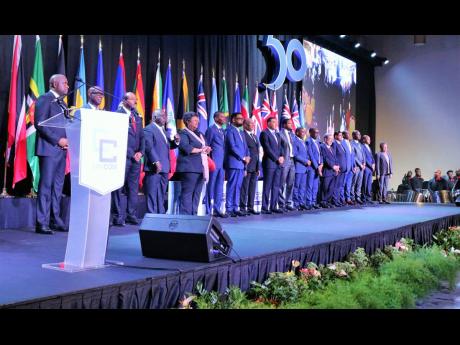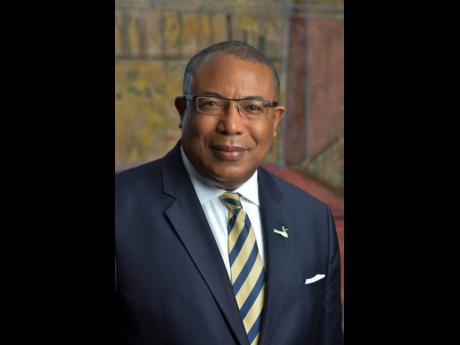Anthony Hylton | Next 50 years of CARICOM
On July 4, the Caribbean Community (CARICOM) began the celebration of the 50th Anniversary of its existence, and the news coming out of the 45th Heads of Government Conference held at the birth place of the regional integration movement, in Trinidad & Tobago, was a fitting punctuation to a period which commenced with great promise and high expectation, but delivered far less than anticipated by the Caribbean population. Yet, hope springs eternal.
Indeed, the measures agreed on by heads of government at the just-concluded meeting were bold and responsive to more than a few of the challenges posed to the integration movement in this period. But we have been here before, and like the previous 50 years, we begin the next 50 years with more hope and faith than the record of achievements, thus far, recommend. A commentary on two of the decisions taken will suffice.
HASSLE FREE TRAVEL
The 2002 amendment to the 1973 Treaty of Chaguramas established the framework for the creation of the CARICOM Single Market and Economy (CSME), providing, inter alia, for the free movement of capital and labour, enshrined in the right of establishment of businesses throughout the 15 member states, as well as the right to hassle-free travel by CARICOM nationals throughout the member states. The latter right was to be subsequently constrained by the requirement of a CARICOM skills certificate, together with prioritisation of the movement of certain categories of labour, until now.
Central to the realisation of the objectives of free movement of labour and the experience of hassle-free travel throughout the region, is the recent decision of the Conference of Heads of Government (the highest decision-making body), to remove the remaining barriers to free movement of labour and hassle-free travel throughout the participating member states of CARICOM (excluding The Bahamas and Haiti) by March of next year. A truly momentous decision, which if appropriately implemented, will go a long way in addressing a major irritant/vexation by the people in the region and the source of much tension among member countries, as demonstrated in the landmark ruling in the Shanique Myrie v. The State of Barbados, decided by the Caribbean Court of Justice.
Not to be under estimated is the likely far-reaching impact on the economies of the member states of CARICOM of this decision, with the anticipated expansion of trade and investment by and among CARICOM nationals in areas, such as tourism, supply chain and logistics, and transport logistics. It is left to be seen whether the necessary amendments to the Treaty provisions and any resulting regulations will bring about any retrenchment of the benefits of this overdue and far-reaching decision.
REVISION OF NETWORK OF TRADE AGREEMENTS
The other far-reaching decision taken at the Heads of Government Conference befitting the spirit of the 50th anniversary reflection and future-facing actions, is the decision to review CARICOM’s network of trade agreements with bilateral partners, including CARICOM/Venezuela agreement, CARICOM/Dominican Republic agreement, CARICOM/Colombia agreement, CARICOM/Cuba, CARICOM/Costa Rica and hopefully CARICOM/USA and CARICOM/Canada agreements.
As someone who has had more than a passing involvement in the negotiation of most of, if not all, these trade agreements, I have long expressed the view that these agreements are outdated and are too shallow in their arrangements, and the resultant benefits to CARICOM and its member states sub-optimal. I am further of the view that these agreements, far from being beneficial to CARICOM member state’s growth and development, are in fact stumbling blocks in the way of sustainable growth and development of both intra-regional and individual member state’s trade and economic growth. More will be said on this issue in another publication.
Suffice to say, that the architecture for trade within CARICOM and between traditional bilateral partners is overdue for a major reset, if not a reimagining. The need to expand the network of trade agreements to include non-traditional trading partners in Latin America, Asia-Pacific and Africa is strongly recommended, if CARICOM economies are to experience the resilience and sustained growth that has eluded it in the previous 50 years. At a minimum, this will require a rethink of Jamaica and CARICOM’s trade strategy and policy, as well as its industrial strategy and policy, and ultimately an upgrade in the level of ambition of trade liberalisation that has heretofore been resisted by some member states. Account must be taken of services trade, digital economy and the need for supply chain resiliency, environmental sustainability and climate justice issues in these upgraded bilateral agreements.
Even as we celebrate the fact of CARICOM’s historic feat as the developing world’s longest surviving integration movement, the decisions taken at the 45th Heads of Government Conference celebrating the 50th anniversary of the birth of the integration movement signals that the leadership gathering on July 4, 2023 are indeed conscious that the pace and ambition of the movement has to be quickened and improved, if the next 50 years is to deliver more than the first 50 years of the integration journey.
It is yet to be seen whether CARICOM member governments have at last found the cure for its Achilles heel, i.e., the implementation deficit.
G. Anthony Hylton is former minister in the ministries of Foreign Affairs & Foreign Trade, Industry, Investment & Commerce. He is shadow spokesman on industry, investment and global logistics and is member of parliament for St Andrew Western. Send feedback to columns@gleanerjm.com


